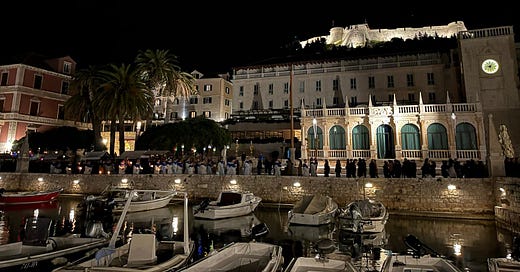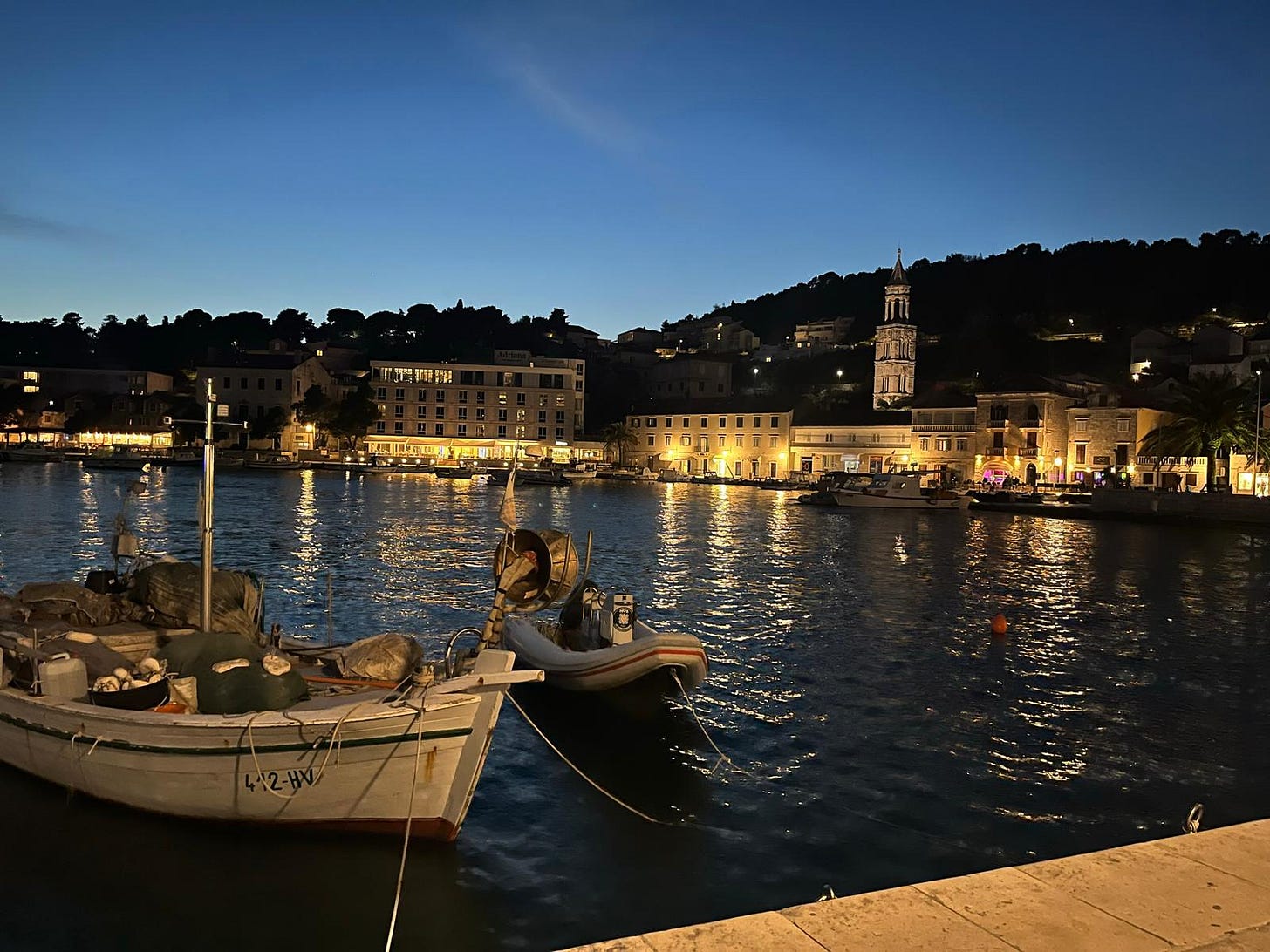“Look at the fashion show,” our guide Ivan says, motioning to the mob of people stood outside the cathedral. Around the doors what looks like half the town is gathered, the children running and playing and the adults standing and chatting and smoking. They’re certainly dressed up; hair is carefully coiffed and full of product and the clothes are ironed and pressed and look carefully chosen. It’s Easter Sunday on the island of Hvar.
Ivan tries to lead us away from the noise around the cathedral, which is tricky since it’s the town’s main sight and the focal point of any good tour of Hvar Town. We strain to hear him over the children playing football and the adults gossiping as they wait for the service.
Easter is a big deal on Hvar. In Croatia as a whole, I suppose. 87% of the population identified themselves as Christians in the 2021 census, a large portion of whom specified that they were Catholics. They take their festivities seriously here. As our tour moves around the town and we move off into steep alleys and narrow passages, men occasionally pass dressed in religious garb, on their way to and from the cathedral.
This is nothing though compared to Good Friday. We have been in Croatia long enough by then to know that Easter will be marked. A country that crawls with as many Catholics as this is hardly going to let a holiday like this go by quietly. We decide to linger in the town centre and see what happens.
We leave the restaurant we’ve eaten in and notice people are just hanging around in the square. This doesn’t look like the regular southern European passeggiata, where townspeople, mostly Italians, spend an evening strolling around, catching up, spreading the news. Here, people are waiting.
We join them. It’s early April and Hvar is mostly out of season. Our restaurant is one of the few on the square open. The list of things to do in Hvar after dark in the months before the summer crowds descend is not long. We could go into one of the empty bars and drink the evening away. Or we could stand and wait, and see what everyone else is waiting for.
We linger on the fringes. The crowd is mostly locals, who can sense outsiders in their midst. Our bag of shopping doesn’t help our cause. Everyone else looks expectant, serious. We look like we are low on sunscreen and have got caught up in all the fuss, which is pretty much what has actually happened.
The commotion is centred around the cathedral. The doors are open even though it’s nearly nine, and every so often a man goes up to them and pops his head in. Still we wait.
We hear them before we see them. After about half an hour we hear singing in the distance. It’s not coming from the cathedral, it’s coming from the town. In a very long line, men in white robes with blue accents walk through the square towards the cathedral. They’re singing. I have no idea what they’re singing, obviously. Croatian wasn’t my strongest subject at school. But it’s the same few lines that they repeat as they walk on towards and then into the cathedral.
Most are carrying lanterns, but some lucky boys get to carry crosses with tiny reproductions of the Man himself nailed on to them. Then an even smaller, select group get to carry what looks to the un-saved eye like a fancy tent. Some of the more important looking of the procession are underneath it.
Those who were at the front of the line of marchers eventually leave the cathedral, and then there are two lines of robed men, one on each side of the square. Eventually they all make it to and back out of the cathedral, at which point the townspeople who’ve been waiting and watching, begin to follow.
“Do we join in?” asks L.
“Absolutely not,” I say, thinking that this is how it starts.
By this, I mean organised religion, belief, faith, and more specifically my conversion to it. I recognise this because I had a fairly lengthy encounter with Christians during my time at university. These Christians were very organised, so organised that they had the budget for and permission to erect a marquee on the campus, in which they held events talking about the greatness of their God. They also really knew how to put on a spread.
They were lovely, which was my problem. I have a hard time saying no to someone I don’t like. Put someone with a nice polite face and a welcoming smile in front of me and I’ll donate a kidney to their ailing mother. Before I knew it I was going to events each week, helping set up and put away tables and chairs.
Occasionally someone would say something weird like, “I believe evolution has stopped, since we’re made in God’s image,” which I found disconcerting. But mostly they were just really nice people who prayed for me and asked how my journey with God was going.
I often replied that it had stalled, but really, my journey never really got going. I took part in an Alpha course, a sort of polite but firm introduction to the gospel, but that did no good, and eventually I built up a real sense of guilt that these people were so hospitable and friendly towards me and I couldn’t reward them with even a tiny ounce of faith in their God.
So when L asked if we should join the procession I said no, because I knew that if I did there was a chance I would be here in Hvar a year from now, in a set of robes, holding a lantern, miming the same few lines of a song I didn’t know the meaning of. I wouldn’t believe, I’d have just made friends.
Eventually, the procession moves off into town again and we walk around the bay towards our guesthouse. We can still hear the singing across the water, and I think about recording it, so I can remember the lines of the song.
You never know, one day, I might need to sing it.









The line "I wouldn’t believe, I’d have just made friends." sums up a lot of people's approach to religion. They want community, feasts, singing, and to repeat lines from languages they don't understand. Not that it's good or bad, just realistic for most. Furthermore, how dare you not pay attention in Croatian class?!! Haha
We visited Hvar in the dead of winter. It was deserted but we had such a lovely time!